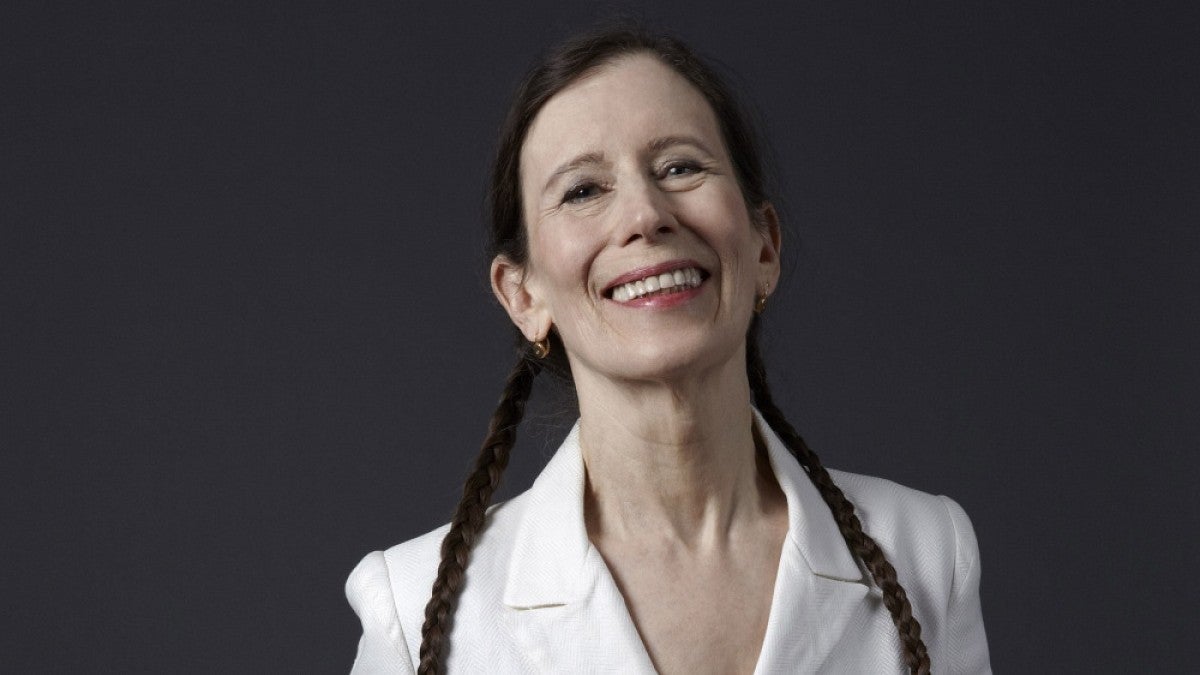Meredith Monk is the kind of artist that people like to call a national treasure.
As the spiritual godmother of a singing style known as “extended vocal technique,” her striking compositions get stuck in your head like an advertising jingle, but point in the opposite direction from cluttered consumer culture.
“After all these years, when I make a new piece, I still try to start with ‘beginner’s mind’,” Monk said. “I go in with no expectations and hopefully without any baggage from the past. I try to be fearless about hanging out in the unknown, and to be playful about the process.”
The 78-year-old Monk said she hoped to share some of the lessons she’d learned from a lifetime of making music, film and performance work, as part of a series of virtual events during her Trotter Digital Residency at the UO School of Music and Dance from Feb. 23-28.
Registration is open now for all events, which are free and available to the general public, as well as students.
“I like to give students inspiration and support for following their dreams and their creativity,” Monk said. “There’s only one of each of us in the universe, so our job is to find a unique path by offering what we and only we have to give.”
Monk’s approach has earned her some of the art world’s highest accolades, including a MacArthur Foundation Fellowship, the Dorothy and Lillian Gish Prize, Officer of the Order of Arts and Letters by the Republic of France, and a National Medal of Arts from President Barack Obama.
It’s also made her an influential pop culture icon, with her music continually popping up in surprising places, from the soundtrack of the Coen brothers’ surreal comedy “The Big Lebowski” to DJ Spooky remixes and a cover by Björk.
“Our community at the School of Music and Dance thrives on innovation,” said Jacqueline Cordova-Arrington, assistant professor of flute. “It’s a place inspired by vision, unafraid to create something on a blank canvas.”
When Cordova-Arrington decided to invite a Trotter Visiting Professor who embodied a “willingness to take creative risks,” Monk was her first choice.
As a member of Carnegie Hall’s resident chamber ensemble, Cordova-Arrington worked with Monk on her first instrumental chamber work, “Backlight,” when Monk held the Richard and Barbara Debs Composer's Chair during the famed venue’s 2014-15 season.
“Meredith had a concept for a particular sound, so she and I experimented with the kinds of sounds that I could make on the flute,” Cordova-Arrington said. “She’s a wonderful collaborator who is very good at translating vocal techniques to instrumental playing and beyond.”
Monk will reveal the creative process behind “Backlight” in one of the virtual events, which will also feature Allison Sniffin, a member of Meredith Monk & Vocal Ensemble, and a UO faculty ensemble as part of a discussion-and-live question and answer session.
Another aspect of working with Monk that Cordova-Arrington said she had enjoyed was the physical and vocal warmups that she described as an “integrated mind-body experience.”
“Our rehearsal didn’t begin with music, it began with being really in sync with our bodies,” Cordova-Arrington said.
Members of Monk’s vocal ensemble, Katie Geissinger and Ellen Fisher, will replicate that experience for an online audience with a workshop titled “Dancing Voice/Singing Body.” The series of virtual events culminates with a live, virtual concert by Monk with Geissinger and Sniffin at 2 p.m. Sunday, Feb. 28.
Monk said she hopes that students will draw encouragement from her revolutionary journey as an artist.
“Some students say, ‘I’m afraid to commit to making art, because what about the money and jobs?’ If you say, ‘This is what I really want to do,’ you will find a way,” Monk said. “If you’re clear about your vision, the world will open up.”
The payoff is a life full of music and movement.
“Studying music in itself is an incredibly rich experience,” Monk said. “I’m so grateful that music is in my life every day. It’s the most wonderful life because it’s always new, it’s always surprising.”
Campus co-sponsors for Monk’s digital residency include the Oregon Humanities Center's Endowment for Public Outreach in the Arts, Sciences, and Humanities; the Division of Equity and Inclusion; The Trotter Fellowship; and the Jordan Schnitzer Museum of Art.
—By Steve Fyffe, School of Music and Dance


